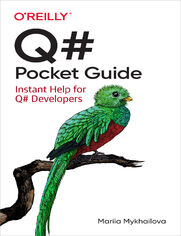Q# Pocket Guide - Helion

ISBN: 9781098108816
stron: 208, Format: ebook
Data wydania: 2022-06-14
Ksi─Ögarnia: Helion
Cena ksi─ů┼╝ki: 92,65 z┼é (poprzednio: 107,73 z┼é)
Oszczędzasz: 14% (-15,08 zł)
Ready to build quantum computing applications using Q# and the Microsoft Quantum Development Kit? This is the book for you. Q# is a domain-specific language for expressing quantum algorithms that combines familiar "classical" language constructs with quantum-specific ones. Ideal for any developer familiar with (or willing to learn) the basics of quantum computing and looking to get started with quantum programming, this pocket guide quickly helps you find syntax and usage information for unfamiliar aspects of Q#.
You'll explore the quantum software development lifecycle from implementing the program to running it on quantum simulators to testing and debugging it. You'll learn to use the tools provided by Microsoft's Quantum Development Kit for each step of the process.
You'll explore:
- Q# language details, including data types, statements, and operators
- Guidelines for organizing Q# code and invoking it from different environments
- Information on simulators and tools in the Microsoft Quantum Development Kit
- Advice on testing and debugging tools and techniques for quantum programs
Osoby które kupowały "Q# Pocket Guide", wybierały także:
- Jak zhakowa 125,00 zł, (10,00 zł -92%)
- Windows Media Center. Domowe centrum rozrywki 66,67 zł, (8,00 zł -88%)
- React.js i Node.js. Kurs video. Budowanie serwisu w oparciu o popularne biblioteki języka JavaScript 128,46 zł, (16,70 zł -87%)
- Angular instalacja i działanie 76,15 zł, (9,90 zł -87%)
- Instalacja i konfiguracja baz danych. Kurs video. Przygotowanie do egzaminu 70-765 Provisioning SQL Databases 285,00 zł, (39,90 zł -86%)
Spis tre┼Ťci
Q# Pocket Guide eBook -- spis tre┼Ťci
- Foreword
- Preface
- Why I Wrote This Book
- Who This Book Is For
- Navigating This Book
- Conventions Used in This Book
- Using Code Examples
- OReilly Online Learning
- How to Contact Us
- Acknowledgments
- I. Q# Programming Language
- 1. Program Structure
- Your First Q# Program
- Namespaces
- Operations and Functions
- Type Declarations
- Comments
- Conclusion
- 2. Data Types
- The Q# Type System
- Primitive Classical Data Types
- Qubits
- Physics-Imposed Constraints
- Abstracting Away Physical Implementation
- The Qubit Data Type
- Other Primitive Quantum Data Types
- Measurement Results
- Pauli Matrices
- Data Structures
- Arrays
- Tuples
- User-Defined Types
- Operations and Functions
- Conclusion
- 3. Expressions
- Equality Operators
- Comparison Operators
- Logical Operators
- Bitwise Operators
- Arithmetic Operators
- Conditional Expression
- Range Operator
- String Expressions
- Array Expressions
- User-Defined Type Expressions
- Call Expressions
- Lambda Expressions
- Adjoint and Controlled Functors
- Conclusion
- 4. Statements
- Example: Calculate Eulers Totient Function
- Working with Variables
- Variable Scope
- Mutable and Immutable Variables
- Declaring Immutable Variables: let Statements
- Declaring Mutable Variables: mutable Statements
- Reassigning Mutable Variables: set Statements
- Assigning Tuples: Tuple Deconstruction
- Conditional Execution: if Statements
- Loops
- Iterate Over a Sequence: for Loops
- Classical Conditional Loop: while Loops
- Call an Operation or a Function: Call Statements
- Stop Execution: return and fail Statements
- Finish Execution: return Statements
- Throw an Exception: fail Statements
- Example: Prepare a Quantum State
- Allocate Qubits: use and borrow Statements
- Quantum Conditional Loops: repeat-until Loops
- Conjugation: within-apply Statements
- Conclusion
- 5. Operations and Functions
- Defining and Using Operations and Functions: The Basics
- Signatures of Callables
- Quantum Gates and Measurements
- Defining and Using Adjoint and Controlled Specializations of Operations
- Using Operation Specializations
- Generating Operation Specializations Automatically
- Defining Operation Specializations Manually
- Functional Elements of Q#
- Callable-Typed Variables
- Using Callables as Arguments
- Partial Application
- Lambda Expressions
- Defining and Using Type-Parameterized Callables
- Conclusion
- II. Using the Microsoft Quantum Development Kit
- 6. Running Q# Programs
- Quantum Applications
- Quantum Software Development
- Quantum Simulators
- Full State Simulator
- Resources Estimator
- Trace Simulator
- Toffoli Simulator
- Sparse Simulator
- Noise Simulator
- Running Q# Programs
- Standalone Q#
- Setting up the project
- Writing the quantum code
- Running the program
- Passing parameters to the quantum code
- Q# with a Classical Host
- Q# with .NET Host
- Setting up the project
- Calling Q# code from C#
- Passing parameters to the quantum code
- Q# with Python Host
- Setting up the project
- Calling Q# code from Python
- Passing parameters to the quantum code
- Q# Jupyter Notebooks
- Setting up the notebook
- Writing the quantum code
- Running the program
- Passing parameters to the quantum code
- Standalone Q#
- Conclusion
- 7. Microsoft Quantum Development Kit Libraries
- Getting and Using the Libraries
- Standard Libraries
- Microsoft.Quantum.Core: Built-In Functions and Attributes
- Microsoft.Quantum.Convert: Data Type Conversions
- Microsoft.Quantum.Logical: Logical and Comparison Functions
- Microsoft.Quantum.Bitwise: Bitwise Functions
- Microsoft.Quantum.Math: Classical Math and Arithmetic
- Microsoft.Quantum.Random: Random Numbers and Probability Distributions
- Microsoft.Quantum.Arrays: Generic Array Manipulation
- Microsoft.Quantum.Intrinsic: Basic Quantum Gates and Measurements
- Microsoft.Quantum.Diagnostics: Testing and Troubleshooting Quantum Programs
- Microsoft.Quantum.Measurement: Additional Measurement Routines
- Microsoft.Quantum.Preparation: Quantum State Preparation
- Microsoft.Quantum.Arithmetic: Quantum Arithmetic
- Microsoft.Quantum.Canon: Catchall
- Advanced Libraries
- Conclusion
- 8. Testing and Debugging
- Inspecting Elements of Q# Programs
- Classical Variables
- Quantum States
- Quantum Operations
- Program Structure and Its Evolution
- Testing Q# Programs
- Two Ways to Write a Test
- Standalone Q# Test Projects
- Testing Classical Conditions
- Testing Conditions on the Quantum State
- Comparing the Unitaries Implemented by Operations
- Conclusion
- Inspecting Elements of Q# Programs
- Index





